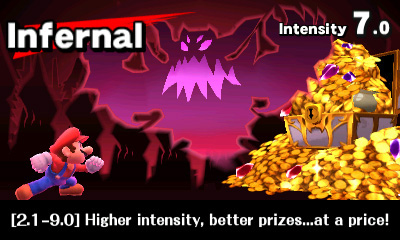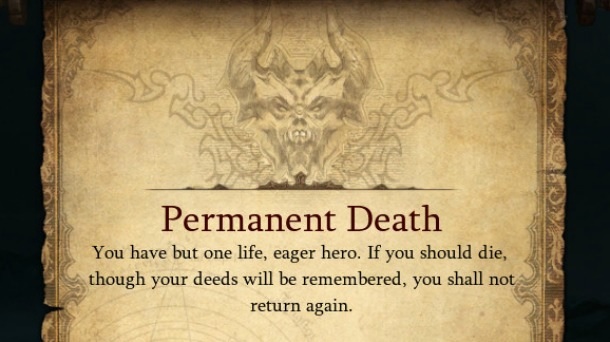Why do some games punish players for trying?
Every once in a while, video games do things that make me angry. Sometimes it is their graphics. Other times it is their controls. These may be minor complaints, but little things add up, and they can sometimes make an otherwise fun and interesting gaming experience feel tedious and annoying. A lot of these problems are issues with design; they cannot be patched out, and are integral to how these games play. This can be frustrating if the game continues to force these issues onto you.
Like many people, I have been incessantly playing Super Smash Bros. for Nintendo 3DS in these past few weeks. It is, in my opinion, a fantastic game, as you will soon read in my review when it goes up later this month. Just recently, however, I have discovered something that is not so much an issue with the game itself as it is a personal annoyance. The game utilizes a simple gambling system for adjusting the difficulty in one of its modes; the more money you are willing to throw in, the harder your opponents will be, and the better rewards you will get out of defeating them. It seams pretty reasonable and straightforward at first – after all, the more you put in, the more you should be able to get out of it – but the more I think about it, the harder it is for me to understand exactly why such a feature was implemented. The problem is that the game penalizes players by taking away half of the money they earned if they lose, which is a pretty harsh penalty for a game that depends on, to an extent, a bit of luck (I found myself dying more from random items and stage hazards than from my opponents themselves). Very recently, I lost about 10,000 coins off of successive losses trying to beat the game at its highest difficulty; needless to say, I am probably not going to try again any time soon.

At a price?! What am I paying for now?
This is what I call the penalty for trying. Instead of getting rewarded for challenging myself, I get penalized for, well, challenging myself. The way Smash Bros. implements its gambling system is interesting, but it really serves no practical purpose for the player. Why would I want to challenge myself if I know that I will be losing something in the process? I like challenging myself for personal satisfaction, if not in-game bonuses, and this penalty for trying certainly undermines that sentiment. Why, then, is this still a thing? Previous Smash games never had it; why the need to implement such a ridiculous penalty system now?
Kid Icarus: Uprising is another game that does this sort of thing to a frustratingly annoying extent. It is, of course, another Sakurai game, and is likely where the gambling system from Smash Bros. comes from. Like Smash, Uprising allows players to gamble in-game currency in exchange for higher difficulty and better rewards. Also like Smash, players lose currency for dying, which in this game occurs at an alarmingly high rate due to the frequency of enemy one-hit KO’s. A key example is during a boss battle late in the game that launches a laser beam that immediately kills Pit if he or she touches it. This would be fine (though still annoying) if it did not occur every ten seconds, and I for the life of me could not figure out how to dodge it. I ended up dying about a dozen times in quick succession, and as a result I finished the level with practically no rewards. This is not an issue of difficulty – though one could argue that it is one of design – because if I were not punished so harshly, I would probably think little about it. However, because it affected me as a player to such a great extent, I could not help but feel cheated by the game, as if it was trying to take the experience away from me.
I should be rewarded for trying different things, or at the very least not be penalized for doing so.
Some games penalize you for trying, but in different ways. Paper Mario Sticker Star also had an issue like this. The game’s many bosses require very specific “stickers” (read: special items) to defeat, and oftentimes these stickers are hidden away in secret areas. What happens when you use the wrong sticker? Well you lose it – permanently. Again, this would not be an issue if getting another one of these special stickers were not such a pain in the butt. Lucky for me then that these stickers are either very expensive or very difficult to find. Moreover, there is no obvious way to tell which stickers should be used when, and so there were multiple instances in which I would have to repeat a boss fight over and over again without accomplishing anything. In this case, I am penalized for trying different things – a penalty for trial and error. Another game (or series of games, in this case) are the Professor Layton games, which takes points away from you for solving a puzzle incorrectly – again, not an issue, except that I am expected to turn the puzzle upside down and read the tears in the paper, not the puzzle on the paper itself. Basically, I am being penalized for solving obscure puzzles incorrectly.

Like what the hell?!
These games have one thing in common: they punish the player for taking risks. I am, in general, against this sort of punishment system in games. I should be rewarded for trying different things, or at the very least not be penalized for doing so. There does exist games that keep this in mind and push forward in what I believe to be the right direction. In Rayman Legends, dying only resets the player back to the latest checkpoint – nothing of value is last, and the player is encouraged to try as many times as they want to get it right. Compare that to Kirby’s Epic Yarn, which takes away a large portion of the collectibles you have gained in that level every time you make even the smallest misstep. In Xenoblade Chronicles, dying simply respawns the player at the nearest landmark without losing any gold or experience points; this game in particular actively pushes players to take risks and try new things, evidenced by the extremely powerful enemies scattered across the game world. Compare that to, say, every other JRPG that effectively progresses the player backwards every time you die.
I hesitate to completely dismiss the notion of punishing the player for taking risks, because there are many games out there that take this concept to the extreme, to the point where it becomes part of the game’s identity. A good example of this is the Fire Emblem franchise, which is known for its “permadeath” feature; if you lose an ally on the battlefield, he or she is gone forever. It is one reason why I had not played a Fire Emblem game until Awakening, which added the option to remove that feature. Personally, I feel that this improves the game in multiple facets because it does implore the player to take risks, which results in an arguably more satisfying experience. Another example is Dark Souls. In this game, whenever the player dies, the character drops all of his or her “souls,” and the player must return to that location in order to retrieve them. If you die before you can get there, however, those souls are gone forever. This is one of the reasons why I never want play a Dark Souls game, because I know that it will likely drive me completely insane.

No thanks, I think I'll pass!
In general, I dislike these sorts of punishments systems because, for the most part, I do not believe that they add anything meaningful to the games they are implemented into. There are exceptions of course, which is why Fire Emblem is so beloved by millions of fans (it plays with your mind and forces players to act thoughtfully and tactfully), but for the most part I feel like most of these games do this without real reason to. I do not enjoy games that punish the player solely for the sake of punishing the player. If I want to try new things, take risks, and enter the unknown, I should be able to do it without the fear of repercussions. Sure, let me die. Fine, let me struggle. But do not punish me for trying.
So tell me, my fellow MyIGNers: what are your thoughts on the penalty for trying? Do you like the gambling system in Smash Bros.? Leave your thoughts in the comments below!
![Amazing Spider-Man Finale Features New [SPOILER] Costume](../../../../../../assets1.ignimgs.com/2018/06/01/untitled-br-1527892808294_small.jpg)